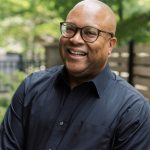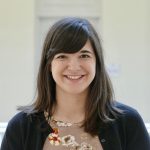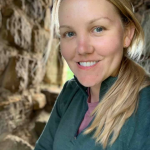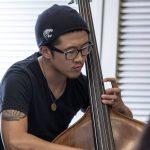Graduate Students
Graduate students in musicology at the University of North Carolina at Chapel Hill come from a wide variety of undergraduate programs, both domestically and internationally. Most enter the program with a Bachelor’s degree, but about one-fifth already have a Master’s degree when they begin their studies at Carolina. Students in this program hold either a Bachelor’s or Master’s degree in a variety of subjects (e.g. performance, composition, conducting, music education, business, physics). The research interests of our students are correspondingly broad, as reflected in the range of topics of dissertations now in progress. Learn more about our illustrious alumni and past dissertations at this database, developed by current student, Erin Pratt.
 Danny Allen – ludomusicology, music of Japan’s Kabuki Theater, music and Geisha, and Western classical music in East Asia
Danny Allen – ludomusicology, music of Japan’s Kabuki Theater, music and Geisha, and Western classical music in East Asia
dpallen@unc.edu
Danny Allen (1st-year graduate student) is a native of North Carolina, and holds a B.A in Piano Pedagogy (2017) from Campbell University where he studied piano under Dr. Richard McKee. He also earned experience as a conductor and trumpet player with the Sandhills Wind Symphony. His current research interests include ludomusicology, music of Japan’s Kabuki Theater, music and Geisha, and Western classical music in East Asia. In addition to his scholarly work, Danny teaches piano in Chapel Hill, working with Harmony Music Studios since 2021.
 Mick Anderson – The Mendelssohns, 19th-century Germany, sacred music, women in music, French vocal literature, German nationalism and the antisemitic voice
Mick Anderson – The Mendelssohns, 19th-century Germany, sacred music, women in music, French vocal literature, German nationalism and the antisemitic voice
micka@unc.edu
Mick Anderson (1st-year graduate student) is a historical musicologist from Virginia’s stunning Allegheny Mountains. He holds a BA in Music with concentrations in Sacred Music and Choral Conducting from the College of William & Mary in Virginia; an MS in Arts Administration from Shenandoah Conservatory; and an MA in Musicology from the University of New Hampshire. He also completed extensive graduate work in Voice Performance and Choral Conducting. Mick’s teaching experience includes History of Western Music; Film Music; World Music; and Women and Music. Mick’s capstone project for the MA in Musicology at UNH explored Felix Mendelssohn’s close relationship with his sister Fanny Hensel, and how Fanny’s sudden death was the catalyst for the unusual composition that became Felix’s final work before his grief led to his own untimely death. Mick is a current participant in the Sustainable Mentorship Program of the American Musicological Society and is the host of Great Sacred Music on The Classical Station (WCPE 89.7).
 Drew Borecky – music and media, music and representation, ludomusicology, music in “nerd” culture
Drew Borecky – music and media, music and representation, ludomusicology, music in “nerd” culture
borecky@ad.unc.edu
Originally from Winston-Salem, NC, Drew Borecky (Ph.D. Candidate) is a graduate of the Masters of Musicology Program at the University of Tennessee Knoxville and holds Bachelors degrees in music and education from Western Carolina University. His research interests concern the interplay of music and various forms of media, including film, television, and video games. His Masters thesis examined the interplay of music and representations of mental illness in the television crime drama. His other research interests include music and representation, ludomusicology, as well as music in “nerd” culture. Drew has presented work at Music and the Moving Image Conference (May 2018-2019) and the Nation Meeting of the American Musicological Society (November 2019).
 Melissa Camp – Arabic music in the 20th century, orientalism, post/anti-colonialism, modernity, music and technology, gender studies
Melissa Camp – Arabic music in the 20th century, orientalism, post/anti-colonialism, modernity, music and technology, gender studies
mcamp@live.unc.edu
Melissa Camp is a Ph.D. candidate originally from Arlington, Texas. She earned a Master of Music in Historical Musicology degree (2018) and a Bachelor of Music Education degree (2016) from Texas Christian University. Her dissertation project explores the introduction of the phonograph and record companies to the Eastern Mediterranean at the height of the Arab nahda. She focuses on how Arab women musicians used the recording studio as a political space to promote anticolonialism, modernity, and early Arab feminism, and she analyzes the recordings’ subsequent effects as they were distributed throughout the Arab world. Her research has been supported by the American Musicological Society, US Department of Education, US State Department, and the Middle East Studies Association. Since receiving candidacy, Melissa has conducted research in Boston, London, Berlin, Cairo, and Paris, and she has presented at the Annual Meetings for the Society for Ethnomusicology and the American Musicological Society.
 Justin Frankeny – networks of power and prestige in “high art” musics across the Americas
Justin Frankeny – networks of power and prestige in “high art” musics across the Americas
frankeny@live.unc.edu
Justin Frankeny is a Ph.D. candidate in musicology, whose research interests concern the networks of power and prestige in so-called “high art” musics across the Americas, especially Cuba and the United States. Originally from Pittsburgh, PA, Justin received a Bachelor of Music from Baldwin Wallace University and a Master of Arts in Musicology from UNC Chapel Hill. His master’s thesis explored issues of distinction and exclusion in the genre of progressive rock during the early 2000s “prog rock resurgence,” with the music of The Mars Volta as his primary case study. His dissertation investigates how composers of the Cuban diaspora navigated the art world of contemporary art music amidst their experiences of migration and the rapidly-changing political and economic climates of the United States and Cuba in the years after the 1959 Cuban Revolution. As a complement to his musicological research, Justin also has a special interest in music librarianship and the digital humanities. He worked for over three years as a graduate assistant to the UNC Music Library, wherein his work included preparing over 1,000 Italian opera libretti for digitization. Justin also has a background in composition and performance of contemporary art music (on clarinet and saxophone), and he continues to perform throughout the Triangle.
 Kira Gaillard – opera, gender studies, representation issues in contemporary art repertoire
Kira Gaillard – opera, gender studies, representation issues in contemporary art repertoire
gailkira@unc.edu
Kira Gaillard is a second-year graduate student originally from Sarasota, FL. She recently graduated from the University of Florida where she received a Master of Music in music history and literature with a cognate in vocal performance. Previously, she attended the Frost School of Music at the University of Miami where she obtained a Bachelor of Music in vocal performance. After graduation, she enjoyed a career in performance and music education in both the public and private sectors. Kira’s current research topics marry her background in opera performance with her interest in gender studies and passion for representation in today’s art music repertoire. Her graduate recital, entitled “When There Are Nine,” featured the work of exclusively female composers and questioned the implications of canonical vocal art music repertoire. Kira’s thesis concentrated on the late works of composer Marc Blitzstein and explored how issues of masculinity, sexuality, and censorship became entwined with the tensions of the McCarthy era. Kira’s other research interests include representations of the American South in twentieth-century opera. As a recipient of an Emerging Scholar Award from the Southern Futures initiative, she hopes to pursue this research as part of UNC’s exciting cohort working to redefine the American South.
 ken tianyuan Ge (he/him) – sound and tourism, neocolonialism, jazz pedagogy and historiography, Black geographies, climate crisis, affect theory, experimental ethnographic writing
ken tianyuan Ge (he/him) – sound and tourism, neocolonialism, jazz pedagogy and historiography, Black geographies, climate crisis, affect theory, experimental ethnographic writing
kge@unc.edu
ken tianyuan Ge (Ph.D. Candidate) is a writer, improvising musician, and photographer from the U.S. South. His research on music and sound in the world of cruise tourism asks how power, capital, and the past permeates an affective life that is both terrestrial and oceanic. ken holds a doctorate in studio music and jazz performance from the University of Miami, and is pursuing a second doctorate in musicology at UNC-Chapel Hill, where he holds the Caroline H. and Thomas S. Royster Fellowship. His career as a working bassist spans the idioms of contemporary jazz, free and improvised music, Latin jazz, cabaret, musical theater, classical crossover, and experimental art/mixed media. His album with avant-pianist Matt Piet, ashes/dreamspeak, is distributed on the independent Chicago label Amalgam. Concurrent with these endeavors, he was deeply embedded within the cruise music industry, having worked as musical director for Celebrity Cruises and Oceania Cruises, and most recently as director of the cruise division at Suman Entertainment Group, one of the largest private employers of bands and musicians in the U.S. ken’s scholarly work builds on these experiences, investigating gender and masculinity in jazz cultures, Black sonic-spatial practices in the “Golden Age” of U.S. radio, the affective-aesthetic dimensions of the climate crisis, and the shape of corporatized musical life at sea.
 Joshua Harton – 19th-century nationalism, failure (privilege/canonicity), borrowing (musical/cultural)
Joshua Harton – 19th-century nationalism, failure (privilege/canonicity), borrowing (musical/cultural)
jaharton@unc.edu
Joshua Harton (BA, Belhaven University; MM, University of South Carolina) is a second-year graduate student whose master’s thesis focused on Saint-Saëns, neoclassicism, and the early music renaissance in France, where nationalism and modernism intersected between 1860-1890. Having also written on Byrd’s politically and religiously charged position in Tudor England, Stravinsky’s convenient nationalism in fin-de-siècle Paris, and capitalist co-optation of Beethoven and Orff in North and South Carolina during the Black Lives Matter movement and the COVID-19 pandemic, Joshua enjoys thinking about moments of musical and historical fluidity, particularly as sonic markers for close, sociocultural listening. Similarly, interests in failure—both as a component of privilege (the opportunity to fail) and in its curatorial role (canonicity)—and musical/cultural borrowing are among Joshua’s primary pursuits. Additional research curiosities include but are not limited to: art, economy, games, gender/identity, literature, and religion. Joshua is a Swiss American, was born in NC, and has also studied at Eastern University, SUNY Albany, and UNC-Greensboro.
Aldwyn Hogg Jr. – Soviet-Russian music, censorship, music and protest, music of the Black Power Era
ahoggjr@live.unc.edu
Aldwyn is a Ph.D. student from the Bahamas. He previously spent six years in Canada completing his B.A. Hons. in Music at the University of Guelph, and his M.A. in Musicology at Western University. His dissertation research will explore what black music can tell us about the dyad of race and technology during the early to mid-twentieth century in the United States of America. He intends to focus on 2 objects and 2 events: the washing machine, the automobile, the advent of nuclear weaponry during the Second World War, and the Apollo 11 mission to the moon. Aldwyn is also very much interested in nightclubs and clubbing, both as a research interest and as a personal hobby. In fact, his recently completed M.A. thesis explored sound, affect, and community within queer nightclubs. Some of his other scholarly interests include: black spoken word poetry and oral performance in the Black Power era, aesthetic criticism, and Soviet Russian symphonies (once upon a time, he wanted to be a russianist!).
 Emily Ann Hynes – cover song, sampling, carceral studies, prison music, critical race theory
Emily Ann Hynes – cover song, sampling, carceral studies, prison music, critical race theory
emihynes@live.unc.edu
Emily Hynes (Ph.D. Candidate) is a member of the Royster Society of Fellows at UNC. Originally from Winnebago, Minnesota, Emily holds a Bachelor of Music degree cum laude from St. Olaf College in Northfield, MN and a Master of Arts in Musicology from UNC at Chapel Hill. Her master’s thesis, “Deep Mapping Prison Music in the American South, 1933—1940,” analyzed the intersections of digital humanities, musicology, and carceral studies; Emily is also highly involved in Digital Humanities (DH) projects that utilize interactive mapping and storytelling to display data, make arguments, and communicate musicological findings to a broader audience. Currently, Emily is working on her dissertation, “Commodifying Criminality: Prison Music as Authenticating Strategy.”
 Eden Jones – popular music, sociomusicology, musical diplomacy, violin
Eden Jones – popular music, sociomusicology, musical diplomacy, violin
edenj@unc.edu
Eden Jones is a first-year graduate student from Wisconsin. In 2022, she received her M.A. in Music with a double concentration in Musicology and Violin Studies from Houghton University in Houghton, New York. Eden also holds a B.A. in English with a minor in Violin Performance from Liberty University in Lynchburg, Virginia. Between 2014-2019 Eden lived in South Korea working as an English teacher and performing violinist where she regularly enjoyed collaborating with local musicians in traditional night markets. She wrote her master’s thesis on the emerging popularity of K-pop in recent years within the U.S., focusing on changing dynamics within the popular music industry as it relates to fan culture, digital connectedness, and globalization. She has presented this research at the 2022 joint annual meeting for the American Musicological Society as well as the 2022 East Asian Music Symposium. Eden has also researched and presented on connections between the violin and human singing voice and how these have been (or can be) used throughout history both as a pedagogical tool and to inform expressive performance. Some of her additional research interests include musical diplomacy, music and mental health, music and aesthetic theory, music and philosophy, and religious music. Outside of music research, performance, and occasional composition, Eden enjoys spending quality time with people, swimming laps, rock climbing, volunteering, and seeking out new experiences. She is an enneagram 1, despite her friends believing her to be a 7.
 Tara Jordan – Sephardic music, Jewish music, diaspora studies, religious music, Jewish languages, oral history, ethnography
Tara Jordan – Sephardic music, Jewish music, diaspora studies, religious music, Jewish languages, oral history, ethnography
tljordan@live.unc.edu
Tara Jordan is a Ph.D. candidate in musicology and holds a Bachelor of Music in flute performance from Furman University and a Master of Music in musicology from the University of Tennessee, Knoxville. Her dissertation, entitled “Mi Monastir: Remembrance and Reconstruction of Interwar Monastir’s Jewish Musical Life,” examines the role that music played in the cultural life of the Monastirli Jewish community from 1912 until 1943 through a combination of archival and oral historical approaches, collected from archives and communities throughout the United States and Israel. In studying a community destroyed by the Holocaust, the project seeks to recover the cultural life of Monastir (now known as Bitola) through music, revealing larger linguistic, religious, and secular trends of this formerly thriving Sephardic Jewish center. Her research has been supported by the American Musicological Society and the Carolina Center for Jewish Studies. Prior to her dissertation work on twentieth-century Sephardic musics, Tara studied the sacred music of the Reformation and Counter-Reformation, and completed a Masters thesis at UNC entitled “Mobilizing Mary: Eleonora Gonzaga’s Religious and Political Influence as Shown in Two Settings of a Pianto Della Madonna.” Tara has presented papers at the annual meeting of the American Musicological Society’s South-Central Chapter meeting (March 2018), the University of Cincinnati’s Musicology and Music Theory Society’s Biennial Student Conference (April 2018), the Newberry Library’s Graduate Student Conference (January 2019), and the South Central Graduate Music Consortium (September 2020).
 Stella Zhizhi Li – musical modernity, music reception, East Asia
Stella Zhizhi Li – musical modernity, music reception, East Asia
lizhizhi@live.unc.edu
Stella ZhiZhi Li is a Ph.D. Candidate originally from Beijing, China. She holds a B.A. in Music Theory and Composition from St. Olaf College. Her research revolves around the music and sound of everyday life in twentieth-century East Asia, with emphases on the cultural history of music, sound studies, de-imperialization, and global modernity. She is also deeply invested in interdisciplinary conversations about gender, race, and power in the twentieth and twenty-first century East Asia. Her dissertation is a cultural history of jazz as dance music in Japan under the Allied Occupation (1945–1952), using jazz as a musical mediation to tell intimate, mundane Japanese stories about social transformation and trauma recovery amid the aftermath of the Second World War. In addition to her dissertation research, Stella has also done extensive work on sound and music history in interwar Japan and early modern China. Her previous research examined the intersection between new sound technologies and inventions of public rituals in 1930s Japan. Her M.A. thesis focused on the Sino-Japanese circulations of school songs in early twentieth century China.
 Sarah Lindmark – popular music, beat-making, music technology
Sarah Lindmark – popular music, beat-making, music technology
lindmark@live.unc.edu
Sarah Lindmark (Ph.D. Candidate) holds a master’s degree in Musicology from the University of California Irvine, where her research focused primarily on theories of allusion in popular music and the mainstream hip hop music video. She has worked for the Cabrillo Festival for Contemporary Music under conductor Marin Alsop, reported on the Bang on a Can Summer Music Festival for the New York Public Radio show New Sounds, and has presented her work at conferences such as the German Society for Popular Music Conference in Oldenburg, Germany, the Annual Plenary of the Society for Musicology in Ireland, and at the Annual Meeting of the American Musicological Society. She has received awards including the Holmes Fellowship, the Leo Freedman Fellowship, the Plantronics Creativity and Innovation Scholarship, and the Barati Cello Scholarship. Her current research interests include electronic music technologies of the 1970s, beatmatching practice, the history of DJing, and dance club culture. Her dissertation is titled “From Jukebox to DJ: Dance, Desire, Technology, and Liberation in Manhattan’s Gay Bars, 1968-1974.”
 Kari Lindquist – 20th-century American music, wind bands, folk-song, musical diplomacy
Kari Lindquist – 20th-century American music, wind bands, folk-song, musical diplomacy
karil@unc.edu
Kari Lindquist (Ph.D. Candidate) holds an MA in Humanities from the University of Chicago with an interdisciplinary focus on Music History and English and a double BA in Comparative Literature and Arts & Ideas in the Humanities from the University of Michigan. Her dissertation explores tours of U.S. wind bands in Cold War musical diplomacy. She uses archival materials and interviews to reconstruct individual musicians’ sonic experiences and encounters in public spaces. Her dissertation research has been supported by the UNC Graduate School and the Bordin/Gillette Fellowship from the Bentley Historical Library at the University of Michigan. She has presented her research at the Society for American Music conference (2019, 2020, 2023), Feminist Theory & Music conference (2022), and annual meeting for the American Musicological Society (2023). As an advocate of community arts education, she previously worked as the Marketing & Community Engagement Coordinator in the DePaul University School of Music and as a music teaching artist in Chicago. She served as a fellow with Carolina Performing Arts as part of Humanities for the Public Good at UNC from 2021-2022 and currently holds a Maynard Adams Fellowship for the Public Humanities.
 Alexander Marsden – popular music, EDM, reception studies
Alexander Marsden – popular music, EDM, reception studies
amarsden@live.unc.edu
Alexander Marsden (Ph.D. candidate) grew up in Lancaster, in the U.K. He holds Bachelor’s and Master’s degrees in music from the University of Cambridge (2010-2014). To date, his primary research has centered around electronic dance music and rap in Britain, focusing on issues of critical reception, the politics of genre definition, and the relationship between concepts of modernism and popular music.
 Destiny Meadows – physical fitness, media studies, sound studies, gender and sexuality studies
Destiny Meadows – physical fitness, media studies, sound studies, gender and sexuality studies
dmeadows@unc.edu
Destiny Meadows (Ph.D. Candidate) holds a master’s degree in musicology from the University of Miami, where her research centered on music video and advocacy at the height of United States HIV/AIDS epidemic. She has also published on gender and sexuality in jazz communities in the US. She received her bachelor’s degree from Furman University in clarinet performance, where she was active in orchestras and chamber groups throughout the Charleston and Greenville areas. In 2022, she was the recipient of the James W. Pruett Summer Fellowship, where she aided in processing the Sammy Nestico Collection and the Henry Donch Collection at the Library of Congress. She has also presented research at the International Music, Sound, and Trauma: Interdisciplinary Perspectives conference, the Harvard Graduate Music Forum, and annual meetings of the American Musicological Society. Destiny’s current research centers on sound construction and materialism in physical fitness media created in the United States during the 1970s and 80s.
 Briana M. Nave – American music, popular music, criticism, music and science, musical evaluation and talent
Briana M. Nave – American music, popular music, criticism, music and science, musical evaluation and talent
brbri@live.unc.edu
Briana M. Nave (Ph.D. Candidate) holds a Master of Arts in Music History and Literature from the University of Maryland, College Park (2019) and a Bachelor of Music in Vocal Performance from Salem College (2016). She has explored topics in gender, criticism, and rock performance, specifically focusing on grunge/punk artist Courtney Love and foundational rock critic Ellen Willis. In spring 2019, her paper “Death and the Widow: Gender, Agency, and the Haunting of Hole’s Live Through This” won the Lowens Award for Best Student Paper from the Capital Chapter of the American Musicological Society. In summer 2022, she presented on Ellen Willis’s pro-sex feminist approach to musical evaluation at the Feminist Theory and Music conference at the University of Guelph. Her current research interests concern the cultural and scientistic construction of musical talent in the late nineteenth and early twentieth centuries, the intersections of music, the scientific method, and biological determinism; and musical evaluation broadly.
 Meg Orita – popular music, social media
Meg Orita – popular music, social media
hmorita@live.unc.edu
Originally from Princeton, N.J., H. Meg Orita (Ph.D. candidate) holds a Bachelor of Music degree, summa cum laude with program honors, in Voice & Opera Performance with a Minor in Musicology from Northwestern University’s Henry and Leigh Bienen School of Music. She recently completed her Master’s thesis, addressing how music of different genres is arranged for figure skating programs. Her current research focuses on narratives of trauma and recovery in the work of 1990s/2000s singer-songwriters. Meg’s research interests incorporate social media ethnography, body-positivity, and feminist theory.
 Erin Pratt – German-language music, art song, music and capitalism, performance studies, rock
Erin Pratt – German-language music, art song, music and capitalism, performance studies, rock
ecp@live.unc.edu
Erin Pratt (Ph.D. candidate) is a graduate of Smith College, where she majored in Music and Classics. Her research focuses primarily on intersections between music and literature in Germany and Austria, particularly in song and prose fiction. Erin’s dissertation project centers on problems of repetition and performance in German strophic song since the eighteenth century. She has a secondary interest in rock singer-songwriters ranging from the Drive-By Truckers to David Bowie. Her master’s thesis, “Walmartland: Music and Corporate Philanthropy in Northwest Arkansas,” combined these disparate interests through critical analyses of two Walmart-sponsored music festivals that respectively featured Jason Isbell and Ludwig van Beethoven. As a complement to her scholarly work, Erin studies classical vocal performance as a mezzo-soprano. Erin also enjoys baking, watching TV with far-flung friends, and playing far too many video games.
 Matteo Sammartano – French baroque music, animality and the use of animals as representation
Matteo Sammartano – French baroque music, animality and the use of animals as representation
mattsam@unc.edu
Matteo Sammartano (2nd-year graduate student) is originally from Aix-en-Provence, France, and received a Master’s degree in Musicology from Aix-Marseille Université. His former research project focused on the representation of the Night in Early music, with an emphasis on baroque opera’s “sleep scenes”. He worked as an intern at the Opera de Marseille library in 2018 and as an Assistant Editor at the Philharmonie de Paris in 2019. His current interests are in baroque cello, French baroque music, and the study of animality and the use of animals as representation or embodiment in the construction of musical material.
 Taylor N. Smith – opera; musical theater; jazz; music within and around the Black church; representation; voice and piano studies; music and psychology
Taylor N. Smith – opera; musical theater; jazz; music within and around the Black church; representation; voice and piano studies; music and psychology
tns@unc.edu
Pianist and soprano, Taylor Smith, is a first-year graduate musicology student at the University of North Carolina at Chapel Hill. A native of Connecticut, Taylor received a Bachelor of Arts in Music History and Analysis, summa cum laude, from Northeastern University in 2016, and a Master of Music in Jazz Studies, concentrating on voice, from The Hartt School in 2021. Throughout her schooling and within the community, Taylor has served as an accompanist, pianist, and singer. From these experiences, she has performed a wide range of works that consist of opera, sacred hymnody, classical, gospel, jazz, R&B, Afro-Cuban jazz, and musical theater. When she begins her Ph.D. studies at UNC, Taylor looks forward to researching the remarkable and pioneering influence that sopranos of color—across opera, musical theater, Broadway, and gospel—have had on representation. Some of her additional research interests include music and psychology; the relationship between Frédéric Chopin’s personality and his solo piano works; classical and jazz piano performance, technique, and harmony; and music and Christianity. While at UNC, Taylor also aspires to continue performing both inside and outside of the university community in the hopes of demonstrating her versatility as a performer, educator, and scholar, and inspire others on their journeys toward becoming performers and performer-scholars.
 Sierriana Terry – anime/cartoon music, late 19th- and early 20th-century American music, African American studies, ethnomusicology
Sierriana Terry – anime/cartoon music, late 19th- and early 20th-century American music, African American studies, ethnomusicology
srrntrry@live.unc.edu
A native of North Carolina, Sierriana Terry (Ph.D. candidate) received her Bachelor of Arts in music from North Carolina Central University. Her research interests include issues of musical characterization in Anime/Cartoons. Her secondary interests include contemporary African American studies in Broadway, musical theater and popular music, and protest culture within music festivals held by people of color in South America, similar to America’s very own AfroPunk festival.
 Justin Wilson – 21st-century opera, music in drag culture, music & addiction
Justin Wilson – 21st-century opera, music in drag culture, music & addiction
wilsonju@unc.edu
Justin Wilson (2nd-year graduate student) comes by his love of music honestly, as he started playing piano around age 3. He has devoted much of his life to the study and performance of music, and he earned a B.M. and M.M. in Vocal Performance from St. Olaf College (Northfield, MN) and Towson University (Towson, MD), respectively. He also holds a J.D. from Duke University. Justin has a multi-decade career as a professional opera singer and practiced law in Washington, D.C. for several years. His research interests encompass opera in the 21st century, music in drag culture, and music and addiction. When not singing, reading, or researching, Justin can be found playing Dungeons & Dragons and teaching private lessons in piano and voice.
 Kendall Winter (she/her) – American popular music, music and politics, women’s studies, genre
Kendall Winter (she/her) – American popular music, music and politics, women’s studies, genre
khwinter@live.unc.edu
Kendall Winter is a Ph.D. candidate from coastal Maine. She completed her M.A. in musicology at Tufts University and earned B.A. degrees in music and classics from Colby College (Waterville, ME). Her dissertation in progress is entitled “Suffragist and Antisuffragist Music and Sound in the United States, 1867 – 1920.” Therein, she interprets pro-suffrage musical idioms, lyrics, performative modes, and sonic signifiers of whiteness and other privileges based on class, education, and citizenship as a problematic, albeit effective, answer to the racism, classism, xenophobia, and sexism that characterized the musical and lyrical choices of the opposition. Her dissertation research has received generous financial support from the American Musicological Society, the Society for American Music, and, at UNC-Chapel Hill, the Graduate School, Music Department, and Graduate and Professional Student Government. She has had the privilege of presenting her research at numerous conferences, including national meetings of the Society for American Music (2020) and American Musicological Society (2022). Outside of research and teaching, Kendall is enthusiastic about service and engagement, holding a number of volunteer, elected, and appointed positions in academic, professional, and community settings.

